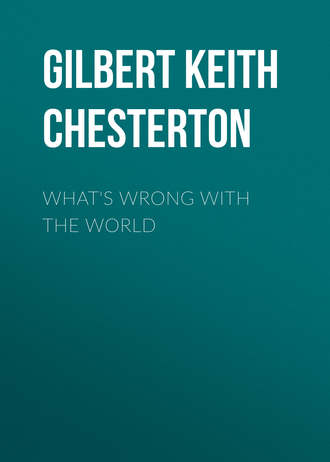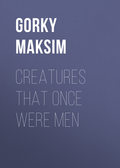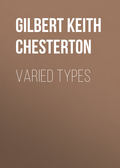
Гилберт Кит Честертон
What's Wrong with the World
VIII. THE BROKEN RAINBOW
I will take one case that will serve both as symbol and example: the case of color. We hear the realists (those sentimental fellows) talking about the gray streets and the gray lives of the poor. But whatever the poor streets are they are not gray; but motley, striped, spotted, piebald and patched like a quilt. Hoxton is not aesthetic enough to be monochrome; and there is nothing of the Celtic twilight about it. As a matter of fact, a London gutter-boy walks unscathed among furnaces of color. Watch him walk along a line of hoardings, and you will see him now against glowing green, like a traveler in a tropic forest; now black like a bird against the burning blue of the Midi; now passant across a field gules, like the golden leopards of England. He ought to understand the irrational rapture of that cry of Mr. Stephen Phillips about “that bluer blue, that greener green.” There is no blue much bluer than Reckitt’s Blue and no blacking blacker than Day and Martin’s; no more emphatic yellow than that of Colman’s Mustard. If, despite this chaos of color, like a shattered rainbow, the spirit of the small boy is not exactly intoxicated with art and culture, the cause certainly does not lie in universal grayness or the mere starving of his senses. It lies in the fact that the colors are presented in the wrong connection, on the wrong scale, and, above all, from the wrong motive. It is not colors he lacks, but a philosophy of colors. In short, there is nothing wrong with Reckitt’s Blue except that it is not Reckitt’s. Blue does not belong to Reckitt, but to the sky; black does not belong to Day and Martin, but to the abyss. Even the finest posters are only very little things on a very large scale. There is something specially irritant in this way about the iteration of advertisements of mustard: a condiment, a small luxury; a thing in its nature not to be taken in quantity. There is a special irony in these starving streets to see such a great deal of mustard to such very little meat. Yellow is a bright pigment; mustard is a pungent pleasure. But to look at these seas of yellow is to be like a man who should swallow gallons of mustard. He would either die, or lose the taste of mustard altogether.
Now suppose we compare these gigantic trivialities on the hoardings with those tiny and tremendous pictures in which the mediaevals recorded their dreams; little pictures where the blue sky is hardly longer than a single sapphire, and the fires of judgment only a pigmy patch of gold. The difference here is not merely that poster art is in its nature more hasty than illumination art; it is not even merely that the ancient artist was serving the Lord while the modern artist is serving the lords. It is that the old artist contrived to convey an impression that colors really were significant and precious things, like jewels and talismanic stones. The color was often arbitrary; but it was always authoritative. If a bird was blue, if a tree was golden, if a fish was silver, if a cloud was scarlet, the artist managed to convey that these colors were important and almost painfully intense; all the red red-hot and all the gold tried in the fire. Now that is the spirit touching color which the schools must recover and protect if they are really to give the children any imaginative appetite or pleasure in the thing. It is not so much an indulgence in color; it is rather, if anything, a sort of fiery thrift. It fenced in a green field in heraldry as straitly as a green field in peasant proprietorship. It would not fling away gold leaf any more than gold coin; it would not heedlessly pour out purple or crimson, any more than it would spill good wine or shed blameless blood. That is the hard task before educationists in this special matter; they have to teach people to relish colors like liquors. They have the heavy business of turning drunkards into wine tasters. If even the twentieth century succeeds in doing these things, it will almost catch up with the twelfth.
The principle covers, however, the whole of modern life. Morris and the merely aesthetic mediaevalists always indicated that a crowd in the time of Chaucer would have been brightly clad and glittering, compared with a crowd in the time of Queen Victoria. I am not so sure that the real distinction is here. There would be brown frocks of friars in the first scene as well as brown bowlers of clerks in the second. There would be purple plumes of factory girls in the second scene as well as purple lenten vestments in the first. There would be white waistcoats against white ermine; gold watch chains against gold lions. The real difference is this: that the brown earth-color of the monk’s coat was instinctively chosen to express labor and humility, whereas the brown color of the clerk’s hat was not chosen to express anything. The monk did mean to say that he robed himself in dust. I am sure the clerk does not mean to say that he crowns himself with clay. He is not putting dust on his head, as the only diadem of man. Purple, at once rich and somber, does suggest a triumph temporarily eclipsed by a tragedy. But the factory girl does not intend her hat to express a triumph temporarily eclipsed by a tragedy; far from it. White ermine was meant to express moral purity; white waistcoats were not. Gold lions do suggest a flaming magnanimity; gold watch chains do not. The point is not that we have lost the material hues, but that we have lost the trick of turning them to the best advantage. We are not like children who have lost their paint box and are left alone with a gray lead-pencil. We are like children who have mixed all the colors in the paint-box together and lost the paper of instructions. Even then (I do not deny) one has some fun.
Now this abundance of colors and loss of a color scheme is a pretty perfect parable of all that is wrong with our modern ideals and especially with our modern education. It is the same with ethical education, economic education, every sort of education. The growing London child will find no lack of highly controversial teachers who will teach him that geography means painting the map red; that economics means taxing the foreigner, that patriotism means the peculiarly un-English habit of flying a flag on Empire Day. In mentioning these examples specially I do not mean to imply that there are no similar crudities and popular fallacies upon the other political side. I mention them because they constitute a very special and arresting feature of the situation. I mean this, that there were always Radical revolutionists; but now there are Tory revolutionists also. The modern Conservative no longer conserves. He is avowedly an innovator. Thus all the current defenses of the House of Lords which describe it as a bulwark against the mob, are intellectually done for; the bottom has fallen out of them; because on five or six of the most turbulent topics of the day, the House of Lords is a mob itself; and exceedingly likely to behave like one.
IX. THE NEED FOR NARROWNESS
Through all this chaos, then we come back once more to our main conclusion. The true task of culture to-day is not a task of expansion, but very decidedly of selection – and rejection. The educationist must find a creed and teach it. Even if it be not a theological creed, it must still be as fastidious and as firm as theology. In short, it must be orthodox. The teacher may think it antiquated to have to decide precisely between the faith of Calvin and of Laud, the faith of Aquinas and of Swedenborg; but he still has to choose between the faith of Kipling and of Shaw, between the world of Blatchford and of General Booth. Call it, if you will, a narrow question whether your child shall be brought up by the vicar or the minister or the popish priest. You have still to face that larger, more liberal, more highly civilized question, of whether he shall be brought up by Harmsworth or by Pearson, by Mr. Eustace Miles with his Simple Life or Mr. Peter Keary with his Strenuous Life; whether he shall most eagerly read Miss Annie S. Swan or Mr. Bart Kennedy; in short, whether he shall end up in the mere violence of the S. D. F., or in the mere vulgarity of the Primrose League. They say that nowadays the creeds are crumbling; I doubt it, but at least the sects are increasing; and education must now be sectarian education, merely for practical purposes. Out of all this throng of theories it must somehow select a theory; out of all these thundering voices it must manage to hear a voice; out of all this awful and aching battle of blinding lights, without one shadow to give shape to them, it must manage somehow to trace and to track a star.
I have spoken so far of popular education, which began too vague and vast and which therefore has accomplished little. But as it happens there is in England something to compare it with. There is an institution, or class of institutions, which began with the same popular object, which has since followed a much narrower object, but which had the great advantage that it did follow some object, unlike our modern elementary schools.
In all these problems I should urge the solution which is positive, or, as silly people say, “optimistic.” I should set my face, that is, against most of the solutions that are solely negative and abolitionist. Most educators of the poor seem to think that they have to teach the poor man not to drink. I should be quite content if they teach him to drink; for it is mere ignorance about how to drink and when to drink that is accountable for most of his tragedies. I do not propose (like some of my revolutionary friends) that we should abolish the public schools. I propose the much more lurid and desperate experiment that we should make them public. I do not wish to make Parliament stop working, but rather to make it work; not to shut up churches, but rather to open them; not to put out the lamp of learning or destroy the hedge of property, but only to make some rude effort to make universities fairly universal and property decently proper.
In many cases, let it be remembered, such action is not merely going back to the old ideal, but is even going back to the old reality. It would be a great step forward for the gin shop to go back to the inn. It is incontrovertibly true that to mediaevalize the public schools would be to democratize the public schools. Parliament did once really mean (as its name seems to imply) a place where people were allowed to talk. It is only lately that the general increase of efficiency, that is, of the Speaker, has made it mostly a place where people are prevented from talking. The poor do not go to the modern church, but they went to the ancient church all right; and if the common man in the past had a grave respect for property, it may conceivably have been because he sometimes had some of his own. I therefore can claim that I have no vulgar itch of innovation in anything I say about any of these institutions. Certainly I have none in that particular one which I am now obliged to pick out of the list; a type of institution to which I have genuine and personal reasons for being friendly and grateful: I mean the great Tudor foundations, the public schools of England. They have been praised for a great many things, mostly, I am sorry to say, praised by themselves and their children. And yet for some reason no one has ever praised them the one really convincing reason.
X. THE CASE FOR THE PUBLIC SCHOOLS
The word success can of course be used in two senses. It may be used with reference to a thing serving its immediate and peculiar purpose, as of a wheel going around; or it can be used with reference to a thing adding to the general welfare, as of a wheel being a useful discovery. It is one thing to say that Smith’s flying machine is a failure, and quite another to say that Smith has failed to make a flying machine. Now this is very broadly the difference between the old English public schools and the new democratic schools. Perhaps the old public schools are (as I personally think they are) ultimately weakening the country rather than strengthening it, and are therefore, in that ultimate sense, inefficient. But there is such a thing as being efficiently inefficient. You can make your flying ship so that it flies, even if you also make it so that it kills you. Now the public school system may not work satisfactorily, but it works; the public schools may not achieve what we want, but they achieve what they want. The popular elementary schools do not in that sense achieve anything at all. It is very difficult to point to any guttersnipe in the street and say that he embodies the ideal for which popular education has been working, in the sense that the fresh-faced, foolish boy in “Etons” does embody the ideal for which the headmasters of Harrow and Winchester have been working. The aristocratic educationists have the positive purpose of turning out gentlemen, and they do turn out gentlemen, even when they expel them. The popular educationists would say that they had the far nobler idea of turning out citizens. I concede that it is a much nobler idea, but where are the citizens? I know that the boy in “Etons” is stiff with a rather silly and sentimental stoicism, called being a man of the world. I do not fancy that the errand-boy is rigid with that republican stoicism that is called being a citizen. The schoolboy will really say with fresh and innocent hauteur, “I am an English gentleman.” I cannot so easily picture the errand-boy drawing up his head to the stars and answering, “Romanus civis sum.” Let it be granted that our elementary teachers are teaching the very broadest code of morals, while our great headmasters are teaching only the narrowest code of manners. Let it be granted that both these things are being taught. But only one of them is being learned.
It is always said that great reformers or masters of events can manage to bring about some specific and practical reforms, but that they never fulfill their visions or satisfy their souls. I believe there is a real sense in which this apparent platitude is quite untrue. By a strange inversion the political idealist often does not get what he asks for, but does get what he wants. The silent pressure of his ideal lasts much longer and reshapes the world much more than the actualities by which he attempted to suggest it. What perishes is the letter, which he thought so practical. What endures is the spirit, which he felt to be unattainable and even unutterable. It is exactly his schemes that are not fulfilled; it is exactly his vision that is fulfilled. Thus the ten or twelve paper constitutions of the French Revolution, which seemed so business-like to the framers of them, seem to us to have flown away on the wind as the wildest fancies. What has not flown away, what is a fixed fact in Europe, is the ideal and vision. The Republic, the idea of a land full of mere citizens all with some minimum of manners and minimum of wealth, the vision of the eighteenth century, the reality of the twentieth. So I think it will generally be with the creator of social things, desirable or undesirable. All his schemes will fail, all his tools break in his hands. His compromises will collapse, his concessions will be useless. He must brace himself to bear his fate; he shall have nothing but his heart’s desire.
Now if one may compare very small things with very great, one may say that the English aristocratic schools can claim something of the same sort of success and solid splendor as the French democratic politics. At least they can claim the same sort of superiority over the distracted and fumbling attempts of modern England to establish democratic education. Such success as has attended the public schoolboy throughout the Empire, a success exaggerated indeed by himself, but still positive and a fact of a certain indisputable shape and size, has been due to the central and supreme circumstance that the managers of our public schools did know what sort of boy they liked. They wanted something and they got something; instead of going to work in the broad-minded manner and wanting everything and getting nothing.
The only thing in question is the quality of the thing they got. There is something highly maddening in the circumstance that when modern people attack an institution that really does demand reform, they always attack it for the wrong reasons. Thus many opponents of our public schools, imagining themselves to be very democratic, have exhausted themselves in an unmeaning attack upon the study of Greek. I can understand how Greek may be regarded as useless, especially by those thirsting to throw themselves into the cut throat commerce which is the negation of citizenship; but I do not understand how it can be considered undemocratic. I quite understand why Mr. Carnegie has a hatred of Greek. It is obscurely founded on the firm and sound impression that in any self-governing Greek city he would have been killed. But I cannot comprehend why any chance democrat, say Mr. Quelch, or Mr. Will Crooks, I or Mr. John M. Robertson, should be opposed to people learning the Greek alphabet, which was the alphabet of liberty. Why should Radicals dislike Greek? In that language is written all the earliest and, Heaven knows, the most heroic history of the Radical party. Why should Greek disgust a democrat, when the very word democrat is Greek?
A similar mistake, though a less serious one, is merely attacking the athletics of public schools as something promoting animalism and brutality. Now brutality, in the only immoral sense, is not a vice of the English public schools. There is much moral bullying, owing to the general lack of moral courage in the public-school atmosphere. These schools do, upon the whole, encourage physical courage; but they do not merely discourage moral courage, they forbid it. The ultimate result of the thing is seen in the egregious English officer who cannot even endure to wear a bright uniform except when it is blurred and hidden in the smoke of battle. This, like all the affectations of our present plutocracy, is an entirely modern thing. It was unknown to the old aristocrats. The Black Prince would certainly have asked that any knight who had the courage to lift his crest among his enemies, should also have the courage to lift it among his friends. As regards moral courage, then it is not so much that the public schools support it feebly, as that they suppress it firmly. But physical courage they do, on the whole, support; and physical courage is a magnificent fundamental. The one great, wise Englishman of the eighteenth century said truly that if a man lost that virtue he could never be sure of keeping any other. Now it is one of the mean and morbid modern lies that physical courage is connected with cruelty. The Tolstoian and Kiplingite are nowhere more at one than in maintaining this. They have, I believe, some small sectarian quarrel with each other, the one saying that courage must be abandoned because it is connected with cruelty, and the other maintaining that cruelty is charming because it is a part of courage. But it is all, thank God, a lie. An energy and boldness of body may make a man stupid or reckless or dull or drunk or hungry, but it does not make him spiteful. And we may admit heartily (without joining in that perpetual praise which public-school men are always pouring upon themselves) that this does operate to the removal of mere evil cruelty in the public schools. English public school life is extremely like English public life, for which it is the preparatory school. It is like it specially in this, that things are either very open, common and conventional, or else are very secret indeed. Now there is cruelty in public schools, just as there is kleptomania and secret drinking and vices without a name. But these things do not flourish in the full daylight and common consciousness of the school, and no more does cruelty. A tiny trio of sullen-looking boys gather in corners and seem to have some ugly business always; it may be indecent literature, it may be the beginning of drink, it may occasionally be cruelty to little boys. But on this stage the bully is not a braggart. The proverb says that bullies are always cowardly, but these bullies are more than cowardly; they are shy.
As a third instance of the wrong form of revolt against the public schools, I may mention the habit of using the word aristocracy with a double implication. To put the plain truth as briefly as possible, if aristocracy means rule by a rich ring, England has aristocracy and the English public schools support it. If it means rule by ancient families or flawless blood, England has not got aristocracy, and the public schools systematically destroy it. In these circles real aristocracy, like real democracy, has become bad form. A modern fashionable host dare not praise his ancestry; it would so often be an insult to half the other oligarchs at table, who have no ancestry. We have said he has not the moral courage to wear his uniform; still less has he the moral courage to wear his coat-of-arms. The whole thing now is only a vague hotch-potch of nice and nasty gentlemen. The nice gentleman never refers to anyone else’s father, the nasty gentleman never refers to his own. That is the only difference, the rest is the public-school manner. But Eton and Harrow have to be aristocratic because they consist so largely of parvenues. The public school is not a sort of refuge for aristocrats, like an asylum, a place where they go in and never come out. It is a factory for aristocrats; they come out without ever having perceptibly gone in. The poor little private schools, in their old-world, sentimental, feudal style, used to stick up a notice, “For the Sons of Gentlemen only.” If the public schools stuck up a notice it ought to be inscribed, “For the Fathers of Gentlemen only.” In two generations they can do the trick.






